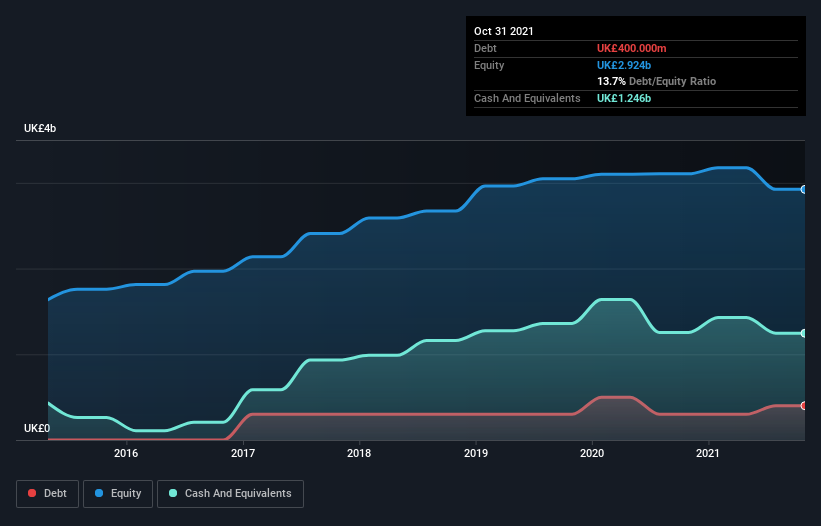- United Kingdom
- /
- Consumer Durables
- /
- LSE:BKG
We Think Berkeley Group Holdings (LON:BKG) Can Stay On Top Of Its Debt
Legendary fund manager Li Lu (who Charlie Munger backed) once said, 'The biggest investment risk is not the volatility of prices, but whether you will suffer a permanent loss of capital.' It's only natural to consider a company's balance sheet when you examine how risky it is, since debt is often involved when a business collapses. As with many other companies The Berkeley Group Holdings plc (LON:BKG) makes use of debt. But the more important question is: how much risk is that debt creating?
When Is Debt Dangerous?
Debt assists a business until the business has trouble paying it off, either with new capital or with free cash flow. If things get really bad, the lenders can take control of the business. While that is not too common, we often do see indebted companies permanently diluting shareholders because lenders force them to raise capital at a distressed price. Of course, debt can be an important tool in businesses, particularly capital heavy businesses. When we think about a company's use of debt, we first look at cash and debt together.
View our latest analysis for Berkeley Group Holdings
What Is Berkeley Group Holdings's Debt?
The image below, which you can click on for greater detail, shows that at October 2021 Berkeley Group Holdings had debt of UK£400.0m, up from UK£300.0m in one year. However, its balance sheet shows it holds UK£1.25b in cash, so it actually has UK£845.5m net cash.

How Healthy Is Berkeley Group Holdings' Balance Sheet?
According to the last reported balance sheet, Berkeley Group Holdings had liabilities of UK£1.76b due within 12 months, and liabilities of UK£788.3m due beyond 12 months. Offsetting these obligations, it had cash of UK£1.25b as well as receivables valued at UK£84.9m due within 12 months. So its liabilities total UK£1.22b more than the combination of its cash and short-term receivables.
Berkeley Group Holdings has a market capitalization of UK£4.73b, so it could very likely raise cash to ameliorate its balance sheet, if the need arose. But it's clear that we should definitely closely examine whether it can manage its debt without dilution. Despite its noteworthy liabilities, Berkeley Group Holdings boasts net cash, so it's fair to say it does not have a heavy debt load!
Another good sign is that Berkeley Group Holdings has been able to increase its EBIT by 24% in twelve months, making it easier to pay down debt. When analysing debt levels, the balance sheet is the obvious place to start. But it is future earnings, more than anything, that will determine Berkeley Group Holdings's ability to maintain a healthy balance sheet going forward. So if you're focused on the future you can check out this free report showing analyst profit forecasts.
Finally, a business needs free cash flow to pay off debt; accounting profits just don't cut it. While Berkeley Group Holdings has net cash on its balance sheet, it's still worth taking a look at its ability to convert earnings before interest and tax (EBIT) to free cash flow, to help us understand how quickly it is building (or eroding) that cash balance. Over the most recent three years, Berkeley Group Holdings recorded free cash flow worth 63% of its EBIT, which is around normal, given free cash flow excludes interest and tax. This cold hard cash means it can reduce its debt when it wants to.
Summing up
While Berkeley Group Holdings does have more liabilities than liquid assets, it also has net cash of UK£845.5m. And we liked the look of last year's 24% year-on-year EBIT growth. So we don't think Berkeley Group Holdings's use of debt is risky. There's no doubt that we learn most about debt from the balance sheet. However, not all investment risk resides within the balance sheet - far from it. To that end, you should be aware of the 1 warning sign we've spotted with Berkeley Group Holdings .
If you're interested in investing in businesses that can grow profits without the burden of debt, then check out this free list of growing businesses that have net cash on the balance sheet.
Valuation is complex, but we're here to simplify it.
Discover if Berkeley Group Holdings might be undervalued or overvalued with our detailed analysis, featuring fair value estimates, potential risks, dividends, insider trades, and its financial condition.
Access Free AnalysisHave feedback on this article? Concerned about the content? Get in touch with us directly. Alternatively, email editorial-team (at) simplywallst.com.
This article by Simply Wall St is general in nature. We provide commentary based on historical data and analyst forecasts only using an unbiased methodology and our articles are not intended to be financial advice. It does not constitute a recommendation to buy or sell any stock, and does not take account of your objectives, or your financial situation. We aim to bring you long-term focused analysis driven by fundamental data. Note that our analysis may not factor in the latest price-sensitive company announcements or qualitative material. Simply Wall St has no position in any stocks mentioned.
About LSE:BKG
Berkeley Group Holdings
The Berkeley Group Holdings plc, together with its subsidiaries, builds homes and neighbourhoods in the United Kingdom.
Excellent balance sheet and fair value.
Similar Companies
Market Insights
Community Narratives



